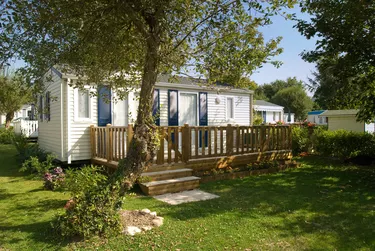For many budget-conscious home shoppers, a single-wide trailer represents an affordable housing option. Properly known as single-wide mobile homes or manufactured homes, these homes provide living space in a long, relatively narrow footprint.

Single-Wide Dimensions
The exact dimensions of a single-wide mobile home can vary considerably from manufacturer to manufacturer and even between models from the same manufacturer. Generally, single-wide mobile homes are available at between 600 and 1,330 square feet. All single-wide mobile homes must be 18 feet wide or less, and must be no longer than 90 feet. The most common dimensions for a single-wide are 15 feet wide by 72 feet long. By comparison, double-wide mobile homes typically measure 56 feet long by 26 feet wide. Usually, if the mobile home measures at least 20 feet wide, it is considered a double-wide model.
Video of the Day
Video of the Day
Characteristics of a Single-Wide
Single-wide mobile homes are characterized by their long and narrow footprints, but they have a number of other common attributes. Rooms on the inside of a single-wide are typically connected to one another rather than separated by a hallway, similar to a railroad apartment or shotgun-style house. If the single-wide has a hallway, it is typically narrow to accommodate the home's narrow orientation. Like most mobile homes, a single-wide does not typically sit directly on the ground. Instead, it may be elevated with risers supporting key support points on the home's underside.
Benefits of a Single-Wide
A single-wide mobile home can be an ideal starter home or an affordable residence for shoppers on a budget. Because of their low cost, they also make affordable second homes and vacation residences. The narrow orientation and relatively small size also make single-wides easier to clean and maintain than their larger cousins. In addition, modern manufacturing process and materials make newer homes extremely energy efficient. Single-wide mobile homes are often licensed and taxed as vehicles, not as real estate, so annual taxes can be significantly less expensive on a single-wide than on a traditional single-family home.
Locations for Single-Wides
In cities and densely populated suburban areas, property developers often set aside plots of land for multiple mobile homes. These mobile home parks allow owners to place their homes on rented land, further reducing their housing costs. In more rural areas, developers often offer new single-wides with dedicated plots of real estate, providing an inexpensive but private living arrangement.
If you plan to buy and finance a new single-wide mobile home, lenders have considerably different rules for loans on manufactured housing. Consult a mobile home sales agent for financing options in your area and to learn about property tax and other legal issues.